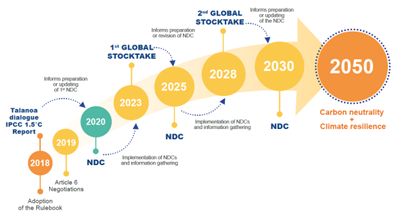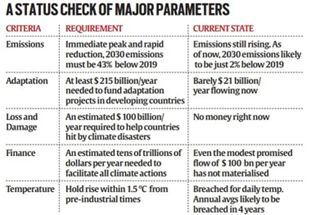- within Energy and Natural Resources topic(s)
- with Senior Company Executives, HR and Inhouse Counsel
- in United States
- with readers working within the Accounting & Consultancy, Retail & Leisure and Law Firm industries
1. ABOUT COP 28
COP 28, the 28th Conference of Parties under the United Nations Framework Convention on Climate Change (UNFCCC), was held in Dubai, UAE, from November 30 to December 12, 2023. The conference aimed to identify global solutions for limiting global temperature rise to 1.5 degrees and yielded a mix of positive outcomes and disappointments. The COP 28 agreement calls upon countries to contribute to tripling of global installed capacity of renewable energy and doubling of annual improvements in energy efficiency, aiming to restrict global warming to approximately 1.5 °C above pre-industrial levels. The Global Stocktake (GST) is a periodic review mechanism established under the Paris Agreement, and the text proposes eight steps to keep the global temperature rise within the ambit of 1.5 degrees. The conference also saw the launch of initiatives focused on collaboration towards reducing sectoral working with both Parties and non-Party stakeholders. Away from the negotiations, COP28 brought a wave of new international pledges – covering everything from oil-and-gas company emissions and funding arrangements and a fund for loss and damage.

Source: https://unosd.un.org/events/COP28SideEvents
2. ADOPTED AGENDAS AT COP 28
| Opening of the session. | Matters relating to the least developed countries |
| Organizational matters | Report of the forum on the impact of the implementation of response measures |
| Reports of the Subsidiary Bodies | Gender and climate change |
| Reporting from and review of Parties included in Annex I to the Convention | Consideration of proposals from Parties for amendments to the Convention under Article 15 |
| Reporting from Parties not included in Annex I to the Convention | Second review of the adequacy of Article 4, paragraph 2(a–b), of the Convention |
| Report of the Adaptation Committee and review of the progress, effectiveness and performance of the Adaptation Committee | Administrative, financial and institutional matters |
| Warsaw International Mechanism for Loss and Damage associated with Climate Change Impacts | High-level segment |
| Matters relating to finance | Other matters |
| Development and transfer of technologies and implementation of the Technology Mechanism: joint annual report of the Technology Executive Committee and the Climate Technology Centre and Network | Conclusion of the session |
| Capacity-building under the Convention |
3. KEY OUTCOMES OF COP 28
A. Expediting a fair, well-organized, and impartial energy transition
- Achieving the target of limiting the temperature increase to 1.5 degrees Celsius hinges on swiftly reducing carbon emissions in the energy system. This entails expediting the shift to clean energy on both the demand and supply fronts. It is crucial that this transition is conducted in an organized and fair manner, considering justice and equity, and also taking into consideration the aspect of energy security.
- In order to expedite the shift towards sustainable energy, the COP 28 Presidency has assumed a leading role by initiating the Global Renewables and Energy Efficiency Pledge. This commitment has garnered support from 130 national governments, including the European Union as of December 11. The Pledge outlines an agreement among signatories to collaborate in tripling the global installed capacity for renewable energy to a minimum of 11,000 GW by 2030. Additionally, the signatories pledge to collectively double the annual rate of global energy efficiency improvements, increasing it from approximately two percent to over four percent each year until 2030.
- The COP 28 Presidency has played a pivotal role in introducing initiatives aimed at fostering collaboration to curb sectoral emissions, engaging both Parties and non-Party stakeholders. One notable initiative is the Global Cooling Pledge for COP 28, which boasts 66 national government signatories. These countries have committed to concerted efforts to reduce emissions related to cooling across all sectors by a minimum of 68 percent globally, relative to 2022 levels, by the year 2050.
- In addition to the initiatives spearheaded by the COP 28 Presidency, there were notable developments across the global climate action agenda pertaining to energy transitions, highlighting collaborative efforts among various stakeholders. The Powering Past Coal Alliance, for instance, announced the inclusion of new national and subnational governments committed to advancing the shift from unabated coal power generation to clean energy. Simultaneously, France, in collaboration with other countries and organizations, introduced the Coal Transition Accelerator. This initiative aims to facilitate the exchange of expertise, formulate new policies based on best practices and lessons learned, and mobilize both public and private financing to support equitable transitions from coal to clean energy.
- In collaboration with the International Renewable Energy Agency (IRENA), a significant initiative was undertaken—the establishment of the Utilities for Zero Alliance. This alliance comprises 31 partners, encompassing 25 global utilities and power companies, all united in a collective pledge to promote electrification, facilitate the development of renewables-ready grids, and accelerate the deployment of clean energy in alignment with the objectives of the 2030 Breakthroughs. Additionally, they introduced new 2030 Breakthroughs addressing methane reduction in the oil and gas sector and advancements in electrification.
- In the realm of shipping, notable announcements were made, including the participation of 10 additional companies in the Cargo Owners for Zero Emission Vessels, a collaborative platform introduced during COP 28. This brings the total number of freight buyers involved to over 35, all dedicated to fostering ambition and taking tangible steps towards achieving zero-emissions in ocean transport. Furthermore, the Green Maritime Africa Coalition (GMAC) actively advocated for the adoption of zero-emission fuels within Africa's maritime sector, aligning with the International Maritime Organization's (IMO) 2050 decarbonization plan.
- The nations participating in the Latin American and Caribbean Renewables Hub have elevated their objectives for renewable energy in overall electricity generation. The new target is set at 80 percent by the year 2030, an increase from the previous goal of 70 percent. Additionally, these countries aspire to achieve a minimum share of renewable energy in the total energy supply, aiming for at least 36 percent by the year 2030.
B. Addressing climate finance challenges
- Under the guidance of the COP 28 Presidency, 13 national governments have officially supported the UAE Leaders' Declaration on a Global Climate Finance Framework. This framework is designed to harness the investment potential of climate finance through collaborative efforts, inclusive opportunities, and widespread implementation. There are plans to provide a progress report on the implementation of this framework immediately after the conclusion of COP 28.
- Guided by the High-Level Champions, multilateral development banks, and international organizations including the Green Climate Fund and the Global Environment Facility, have given their endorsement to the Joint Declaration and Task Force on Credit Enhancement of Sustainability-Linked Sovereign Financing for Nature and Climate. The Declaration, along with the establishment of the Task Force, seeks to address the requirements of developing countries by offering enduring fiscal solutions. It aims to steer clear of short-term debt relief dependent solely on international development assistance.
- During COP 28, a collective appeal for collaboration emerged, focusing on the improvement of the conducive environment to hasten the mobilization of private finance for adaptation and resilience. This call to action was formulated by private sector stakeholders, several Parties, and received support from High-Level Champions. The shared goal is to stimulate private finance initiatives specifically aimed at adaptation efforts.
- Furthermore, the Global Capacity Building Coalition, backed by Bloomberg Philanthropies and involving organizations such as the UN, World Bank, various multilateral development banks, International Monetary Fund, International Sustainability Standards Board, Network for Greening the Financial System, Glasgow Financial Alliance for Net Zero (GFANZ), and UN Principles for Responsible Investment, is dedicated to substantially enhancing the accessibility and impact of technical assistance programs for climate finance geared towards financial institutions in emerging markets and developing economies.
- In collaboration with the Glasgow Financial Alliance for Net Zero (GFANZ), eight export credit agencies, in conjunction with the Innovation and Knowledge Hub at the University of Oxford, Future of Climate Cooperation, and the UN Environment Programme Finance Initiative (UNEP FI), have inaugurated the UN-convened Net-Zero Export Credit Agencies Alliance (NZECA). As a confirmed partner of the Race to Zero campaign, NZECA is poised to contribute to the decarbonization of global trade, fostering collaborative efforts between public and private finance.
- An illustration of initiatives undertaken by multilateral development banks and international financial institutions in this regard is the introduction of the Nature Solutions Hub for Asia and the Pacific by the Asia Development Bank. This initiative is geared towards actively increasing the influx of both public and private finance dedicated to the preservation of nature and the mitigation of biodiversity loss in the Asia-Pacific region.
C. Centering on individuals, their lives, and their means of livelihood
- The initial implementation report unveiled during COP28 evaluates the advancements achieved and the obstacles yet to be overcome in addressing adaptation gaps and bolstering resilience from the present until 2030. The Sustainable Adaptation Agenda (SAA) has specifically emphasized health, food and agriculture, and nature, with notable progress highlighted by the High-Level Champions during the course of COP 28.
- This aspect exemplified a seamless shift from negotiation to implementation during COP 28. On the inaugural day of the conference, the operationalization of the fund, along with its funding arrangements for addressing loss and damage, was successfully agreed upon. Subsequently, several national governments and organizations made financial commitments to this critical topic.
- Under the guidance of the COP 28 Presidency, a significant effort was made to fortify collective action for building climate resilience in highly vulnerable countries and communities. A total of 78 national governments, including the European Union, and 40 organizations pledged their support by endorsing the COP 28 UAE Declaration on Climate Relief, Recovery, and Peace. Commitments from signatories include amplifying financial assistance for climate adaptation and resilience, advancing best practices and programming, and reinforcing coordination, collaboration, and partnerships. The parties involved have committed to reconvening at COP 29 to assess progress and potentially initiate further actions.
- Under the leadership of the COP 28 Presidency, a groundbreaking initiative unfolded with the organization of the inaugural health day. This event aimed to reinforce the crucial linkages between health and climate within the action agenda, a pivotal component of resilience-building focused on people. A noteworthy 141 national governments, including the European Union, participated in endorsing the COP 28 UAE Declaration on Climate and Health. This commitment involves advancing climate-resilient development, fortifying health systems, and fostering the creation of resilient and flourishing communities, all for the well-being of current and future generations.
- Ensuring the resilience of food systems that can adapt to the impacts of climate change is crucial for securing people's livelihoods. In recognition of this importance, the COP 28 Presidency introduced the UAE Declaration on Sustainable Agriculture, Resilient Food Systems, and Climate Action. A total of 153 national governments, including the European Union, endorsed this declaration. The signatories commit to various actions, including the scaling up of adaptation and resilience measures to diminish the vulnerability of all farmers, fisherfolk, and other food producers to climate change impacts. Additionally, the declaration emphasizes the promotion of food security and nutrition through increased efforts to support vulnerable populations.
- In pursuit of eradicating hunger and all types of malnutrition while keeping the temperature rise below 1.5 °C, the UN Food and Agriculture Organization (FAO) has unveiled a global roadmap. This roadmap outlines 120 actions and key milestones across ten domains, backed by evidence accumulated by the FAO over several years.
- The High-Level Champions and the Marrakech Partnership have consistently emphasized the importance of nature, making it a key focus. During the nature day at COP 28, the High-Level Champion announced the launch of the COP 28 Joint Statement for Climate, Nature, and People. This statement, endorsed by 18 national governments, including two signatory presidencies (China and the United Arab Emirates), along with voluntary partnerships, initiatives, and coalitions, commits to collaborative efforts for integrated action on climate and nature.
- Forestry plays a pivotal role in the context of climate change and is closely tied to livelihoods. At COP 28, countries and organizations marked the 10th anniversary of the Warsaw Framework for REDD+ with a status update indicating that 60 developing countries are actively implementing REDD+ activities. Leaders from governments, civil society, and the business sectors gathered at the Forest & Climate Leaders' Partnership COP28 Ministerial, expressing renewed ambition to align with the 2021 Glasgow Leaders' Declaration on Forests and Land Use. Looking ahead, Colombia, the Democratic Republic of Congo, Ghana, and Papua New Guinea announced national packages for forests, climate, and nature supported by financing from public, private, and civil society partners.
- Regarding advancements in adaptation and resilience efforts, within the Early Warning for All initiative – launched by the UN Secretary-General at COP 27 – the UN Office for Disaster Risk Reduction and the World Meteorological Organization released a progress report. The report indicates that Africa has doubled the quality of coverage provided by early warning systems, although it still remains below the global average.
- Under the guidance of the COP 28 Presidency and with support from Bloomberg Philanthropies, the Coalition for High Ambition Multilevel Partnership (CHAMP) for Climate Action was introduced. A significant development occurred as 65 national governments pledged their commitment to CHAMP, aiming to strengthen cooperation, as applicable and appropriate, with subnational governments in the planning, financing, implementation, and monitoring of climate strategies.
- A notable area of progress, facilitated by the involvement of High-Level Champions, is the introduction of new Breakthroughs. Specifically, the launch of the Buildings Breakthrough, in collaboration with the Governments of France and Morocco and UNEP, is designed to establish near-zero emissions and climate-resilient buildings as the standard by 2030 within the broader Breakthrough Agenda. The UNEP/GlobalABC secretariat, along with the International Energy Agency and IRENA, in collaboration with the High-Level Champions, will conduct an annual assessment to gauge global progress in the buildings sector.
D. Ensuring comprehensive inclusivity as the foundational principle for all initiatives
- Before COP 28, the COP 28 Presidency and the Executive Secretary of the UNFCCC released a joint statement, expressing their commitment to collaboratively ensure that COP 28 becomes the most inclusive UN Climate Change Conference to date. Additionally, the COP 28 Presidency took an early step by appointing a Youth Climate Champion. This role was established by the Presidency, expanding on the framework set by the COP27 Youth Envoy.
- The COP 28 Presidency, in collaboration with the Youth Climate Champion and YOUNGO (the official children and youth constituency of the UNFCCC), organized the Dubai Youth Dialogue. During this event, YOUNGO, with the backing of the Youth Climate Champion, unveiled the results of the Youth Stocktake—a process initiated during the 58th Subsidiary Bodies Sessions to assess the advancements in youth inclusion and policy implementation.
- The COP 28 Presidency and the COP 28 High-Level Champion played a prominent role in initiating the COP 28 Gender-Responsive Just Transitions and Climate Action Partnership. The 78 national governments endorsing this partnership commit to collaborative efforts aimed at supporting fair and inclusive transitions that promote gender equality and align with the objectives of the enhanced Lima Work Program on Gender and its Gender Action Plan. Furthermore, there is a commitment to reconvene for a dialogue at COP 32 to provide updates on the implementation of the partnership's commitments.
- Furthermore, as a result of collaborative efforts led by UN Women, the COP 28 Presidency, COP 28 High-Level Champion, and International Union for Conservation of Nature (IUCN), Women's Environment and Development Organization, and the UNFCCC secretariat, the Global Call to Action was issued. This call urges world leaders, policymakers, and key stakeholders in the data system to generate and utilize gender-environment data as a means to propel advancements in gender-responsive climate and environment commitments.
- Additionally, COP 28 highlighted initiatives aimed at fostering the participation, inclusion, and leadership of Indigenous Peoples. In collaboration with the High-Level Champion of COP 28, the International Union for Conservation of Nature (IUCN), the International Indigenous Forum on Biodiversity, and the IUCN Indigenous Peoples Organizations members, the Podong Indigenous Peoples Initiative was launched. This initiative is designed to directly allocate funding to Indigenous Peoples, ensuring that a minimum of 85 percent of funds reaches Indigenous territories and communities.
- The 5th Capacity-building Hub played a crucial role in providing an inclusive and interactive platform for various capacity-building actors, particularly during its 'Capacities for Rights-based Climate Action Day.' This dedicated day focused on incorporating rights-based participatory approaches into climate action. It actively engaged grassroots organizations, Indigenous Peoples, local communities, youth, children, gender advocates, and people with disabilities, enhancing their capacity to actively and constructively participate in the climate change process.
- The Technology Executive Committee, in collaboration with Enterprise Neurosystem, a non-profit open-source artificial intelligence (AI) community, introduced the AI Innovation Grand Challenge during the High-level Event on Artificial Intelligence for Climate Action. The objective of this initiative is to identify and support the development of AI-powered solutions for climate action, with a specific focus on developing countries, particularly Small Island Developing States (SIDS) and Least Developed Countries (LDCs). The AI Innovation Grand Challenge is a component of the #AI4ClimateAction Initiative by the Technology Mechanism.
- In a comprehensive approach encompassing the entire society and economy, sectors such as sports, fashion, entertainment, and culture were actively involved at COP 28. Their presence aimed to showcase initiatives dedicated to involving all levels of society in the climate conversation. Notably, the Sports for Climate Action initiative presented its strategy to amplify the collective role of sports in climate action, emphasizing fan and community engagement. The Global Climate Action Awards recognized the winners of the year, highlighting the innovative climate actions undertaken by young people worldwide to ensure their communities become more sustainable, resilient, and equitable places to live.
E. Global Stocktake Text
- The Global Stocktake (GST) is a scheduled assessment mechanism established under the Paris Agreement in 2015.
- The proposed text outlines eight steps aimed at limiting the global temperature rise to 1.5 degrees Celsius.
- It advocates for the tripling of global renewable energy capacity and doubling the worldwide average annual rate of energy efficiency improvements by the year 2030.
- The text emphasizes the need for significant reductions in non-CO2 emissions, specifically targeting a substantial decrease in global methane emissions by the year 2030.
F. Transitioning away from Fossil Fuels
- COP28 advocates for a transition away from fossil fuels within energy systems, emphasizing the importance of conducting this transition in a just, orderly, and equitable manner. The goal is to accelerate actions during this pivotal decade to achieve a net-zero carbon emissions status by the year 2050.
G. Loss and Damage Fund
- Member countries have reached an agreement to activate the Loss and Damage (L&D) fund, which is designed to provide compensation to countries dealing with the impacts of climate change.
- A designated percentage of the fund is allocated for the benefit of Least Developed Countries and Small Island Developing States, acknowledging their heightened vulnerability.
- In its initial phase, the World Bank will take on the responsibility of overseeing the loss and damage fund.
H. Global Renewables and Energy Efficiency Pledge
- The Pledge outlines that signatories are committed to collaborating in order to triple the global installed renewable energy generation capacity to a minimum of 11,000 GW by the year 2030.
- Additionally, it calls for a collective effort to double the global average annual rate of energy efficiency improvements, increasing it from around 2% to over 4% each year until 2030.
I. Global Cooling Pledge for COP 28
- It encompasses 66 national government signatories who have pledged to collaborate in reducing cooling-related emissions across all sectors by a minimum of 68% globally, relative to 2022 levels, by the year 2050.
J. Declaration to triple Nuclear Energy
- The declaration unveiled at COP28 sets the objective of tripling the global nuclear energy capacity by the year 2050.
4. MAJOR ENGAGEMENTS OF INDIA IN COP 28
Global River Cities Alliance (GRCA)
- Launched at COP 28, the initiative is spearheaded by the National Mission for Clean Ganga (NMCG) under the Ministry of Jal Shakti, Government of India.
- The Global River Cities Alliance (GRCA) underscores India's commitment to sustainable river-centric development and climate resilience.
- This platform is designed to facilitate knowledge exchange, promote river-city twinning, and facilitate the dissemination of best practices in river management.
Green Credit Initiative
- The Green Credit Initiative has been formulated as a mechanism to encourage voluntary environmentally friendly actions, serving as an effective response to the challenge of climate change.
- The initiative envisions the issuance of Green Credits for activities such as planting on waste/degraded lands and river catchment areas, aiming to rejuvenate and revive natural ecosystems.
Quad Climate Working Group (QCWG) on localized climate action
- The event centered on acknowledging and enhancing the role of local communities and regional governments in promoting sustainable lifestyles.
Phase II of the Leadership Group for Industry Transition (Lead IT 2.0)
- It will concentrate on promoting an inclusive and just transition within the industry, facilitating the co-development and transfer of low-carbon technology, and providing financial support to emerging economies as they undergo transitions in their industries.
5. KEY CONCERNS
No specific timelines for fossil fuel phase-out:
The agreement was deficient in providing a clear and immediate plan for the phase-out of fossil fuels. It employed vague language, such as "transitioning away," without specifying concrete timelines or targets.
No Specified targets on Tripling of Global Renewable energy:
The COP28 agreement urges countries to play a part in the global effort to triple the installed capacity of renewable energy and double annual improvements in energy efficiency. It's important to note that the tripling is considered a global target, and there isn't a requirement for each country to individually triple its current installed capacity. The agreement, however, does not provide clarity on the specific mechanisms or strategies that will ensure the achievement of this global tripling goal.
No clear mechanism for Achieving Adaptation Goals:
The developing countries expressed dissatisfaction with the adaptation draft, noting that it fell significantly below their expectations. They highlighted the absence of details regarding how the stated objectives would be realized and the lack of clarity on the mechanisms that would fund these adaptation efforts.
Lack of Accountability on Financial Commitments:
As of now, there is no established mechanism in place to hold governments and institutions accountable for meeting their climate financing commitments.
Varying Interpretations on Climate Finance:
Indeed, data on climate finance flows are gathered using diverse methodologies, and the interpretations can vary. This variation in approaches introduces complexity in understanding and comparing climate finance figures. Additionally, there is a risk of double counting, where the same funds are reported by multiple parties. This double counting can result in an overestimation of the actual financial flows dedicated to climate-related initiatives.
Resistance over Phase-Down of Coal:
There was an attempt to specify that the opening of new coal-fired power plants must include an in-built carbon capture and storage facility. However, this proposal faced strong resistance from countries such as India, China, South Africa, and others.
Concerns over Methane Emissions Cut:
The agreement emphasizes the need to "accelerate and substantially reduce non-carbon-dioxide emissions globally, including in particular methane emissions by 2030." However, addressing methane emissions, especially in sectors like agriculture, may involve making adjustments to existing practices, and this could be a sensitive issue in countries like India where agricultural patterns are deeply ingrained and play a critical role in the economy and livelihoods.
6. WAY FORWARD
Clear Roadmaps and Timelines
To enhance accountability and progress, it is essential to develop clear and detailed roadmaps with specific timelines for achieving key milestones and targets. Establishing interim goals that align with the overall long-term objectives can contribute to a more structured and accountable approach in pursuing climate-related initiatives.
Commit to Climate Finance Targets
The expectation is that all bilateral donors should fulfill their climate finance commitments and establish more ambitious targets. There is an increased urgency for integrating climate finance into national development plans and policies, emphasizing the critical role of aligning financial support with broader sustainable development objectives.
Enhanced National Action Plans (NDCs)
Countries are urged to review and enhance their Nationally Determined Contributions (NDCs) to incorporate more ambitious and specific climate action targets. These contributions should span across various sectors, encompassing energy, transportation, agriculture, and industry, to comprehensively address the challenges of climate change.
Legislation and Policy Support
To support the implementation of climate targets, it is essential to enact and strengthen domestic legislation and policies. Integrating climate considerations into existing laws and regulations across various sectors can contribute to a more comprehensive and effective approach to address climate change at the national level.
Capacity Building
Investing in capacity building is crucial at local, national, and international levels to enhance the ability to implement climate actions effectively. This involves providing training and resources to support the development of technological, financial, and institutional capacities necessary for successful climate initiatives.
International Cooperation
To accelerate the adoption of environmentally friendly solutions, it is crucial to facilitate the transfer of climate-friendly technologies, particularly from developed to developing countries. Additionally, sharing experiences, lessons learned, and best practices among countries can contribute to a more widespread and effective implementation of sustainable practices across industries.
7. CONCLUSION
COPs play a crucial role in the fight against climate change, and while the road ahead is both challenging and promising, success demands collective determination, unwavering commitment, and an acknowledgment of the high stakes involved. The global community can build a sustainable and resilient future by embracing determined contributions and establishing genuine partnerships. As we enter a phase of implementation, it is imperative that pledges, declarations, and commitments are delivered, initiatives are operationalized, and progress is reported and expanded toward their goals.
In this context, it is noteworthy that the UN Secretary-General commissioned a meeting to discuss the implementation of recommendations from the High-Level Expert Group on Net-Zero Emissions Commitments of Non-State Entities. Additionally, the Taskforce on Net Zero Policy was launched to create a collaborative space for sharing knowledge, practices, and insights among policymakers and regulators working toward net-zero aligned policies. Furthermore, the COP 28 Presidency introduced the Net-Zero Transition Charter: Accountability Mobilization for the Private Sector, urging organizations to publicly commit to net-zero emissions, establish credible and transparent transition plans, and regularly report accurate and complete progress updates.
Accountability is a crucial aspect of all actors and forms of global climate action. Encouragingly, some initiatives launched at COP 28 have already committed to reconvening at future COPs to discuss their progress and implementation. Additionally, several existing initiatives have published progress reports, outlining their achievements and challenges. This trend signifies a growing momentum on the topic of accountability and supports greater transparency and responsibility in the pursuit of climate-related objectives.
Transparency serves as a mechanism for achieving accountability. The UNFCCC secretariat will collaborate with the COP 28 Presidency to enhance transparency for initiatives launched during COP 28 through the Global Climate Action Portal. This platform not only offers a means for publicly communicating goals and functions but also establishes a foundation for tracking progress. Initiatives are expected to provide annual disclosures to the UNFCCC secretariat, offering information and updates to ensure accountability in their endeavors.
As the first Global Stocktake concludes at the end of COP 28, the initiation of a new five-year cycle on climate action under the Paris Agreement is imminent. In anticipation of this, the High-Level Champions, the Marrakech Partnership, and other collaborators have compiled the '2030 Climate Solutions: an Implementation Roadmap.' This roadmap outlines a set of solutions framed in specific actions, incorporating insights from a diverse array of non-Party stakeholders. It highlights effective measures that are currently being undertaken and need scaling up and replication, as well as identifying existing gaps that must be addressed to achieve the goal of halving global emissions, closing adaptation gaps, and enhancing the resilience of four billion people from vulnerable groups and communities to climate risks by 2030.
The accountable implementation of the myriad actions presented, facilitated through collaboration among various actors across the global climate action agenda, has the potential to make a significant contribution towards correcting the course and achieving climate action targets in this crucial decade.
8. REFERENCES
- https://unfccc.int/sites/default/files/resource/Summary_GCA_COP28.pdf
- https://www.drishtiias.com/daily-updates/daily-news-editorials/cop-28-charting-the-roadmap-for-climate-action
- https://www.cop28.com/en/news-and-media
- https://www.carbonbrief.org/cop28-key-outcomes-agreed-at-the-un-climate-talks-in-dubai/
- https://unfccc.int/news
The content of this article is intended to provide a general guide to the subject matter. Specialist advice should be sought about your specific circumstances.





